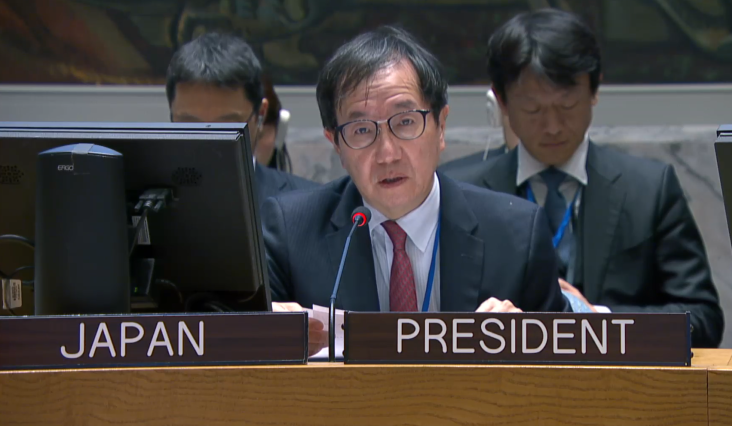スーダンにおける文民保護に関する安保理会合における山﨑大使ステートメント
令和6年3月20日

(As delivered)
I thank Ms. Wosornu of OCHA, Mr. Martina of FAO, and Mr. Skau of WFP for their insightful briefings, which highlighted the gravity of the situation.
Japan thanks Guyana and Switzerland, as co-focal points for conflict and hunger, joined by Sierra Leone and Slovenia for requesting this timely and important meeting.
Two weeks ago, from this Chamber, the Secretary-General called on all parties in Sudan to honor a Ramadan cessation of hostilities to set a firm path towards lasting peace for the Sudanese people.
The African Union and the League of Arab States echoed his call, as did the Security Council by swiftly adopting resolution 2724 (2024).
In spite of these strong and united voices, the eleven-month-long clashes between the Sudanese Armed Forces (SAF) and Rapid Support Forces (RSF) have continued. We are alarmed by the fact that nearly 18 million people in Sudan now face acute food insecurity largely as a result of this war.
Bearing this situation in mind, I would like to stress three points today.
First and foremost, the most important step to be taken immediately is to heed the unanimous calls of the international community and honor the spirit of Ramadan by observing a cessation of hostilities. The Council supports the coordinated international and regional efforts for a negotiated peaceful solution. We reaffirm our support to the Personal Envoy, Ramtane Lamamra, to continue fully utilizing his good offices.
Second, the parties must uphold their obligations under international humanitarian law. Starvation cannot be used as a means of warfare. The parties must protect civilians and not threaten civilian infrastructure or the provision of vital goods and services. We are concerned that many farmers have been displaced from their farmland. Attacks against economic and agricultural infrastructure have also severely damaged Sudan’s food system.
Third, full, rapid, safe, and unhindered humanitarian access is critically important. Crossline and cross-border operations are imperative for delivery of humanitarian assistance to conflict-affected areas including Darfur, Kordofan, Khartoum, and Al-Jazira. All the humanitarian aid providers must be protected and their presence must be secured. We call on both parties to fully commit to dialogue to ensure unobstructed crossline and cross-border operations and comply with their commitments under the Jeddah Declaration.
In this vein, we positively note the Sudanese authorities’ announcement that they will facilitate humanitarian access through certain border points on Chad, South Sudan, and Egypt and air transportation, as well as some progress on the issuance of visas and customs clearances.
Japan joins others in calling for donors to further their humanitarian assistance for the Sudanese people.
Let me conclude my statement by reiterating our strong commitment to the Sudanese people and their future.
